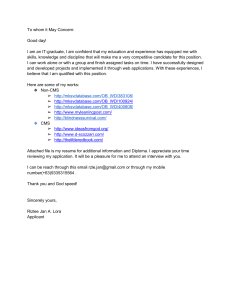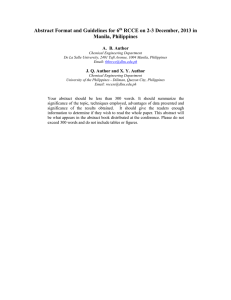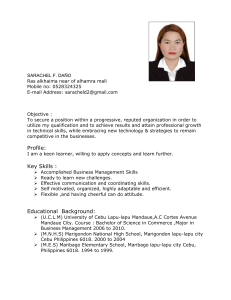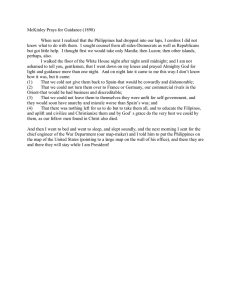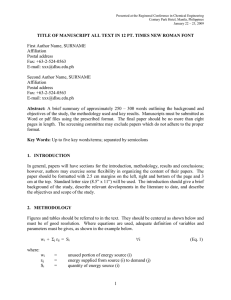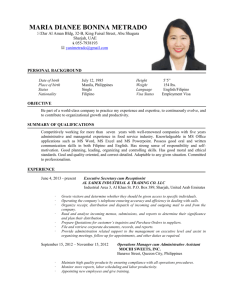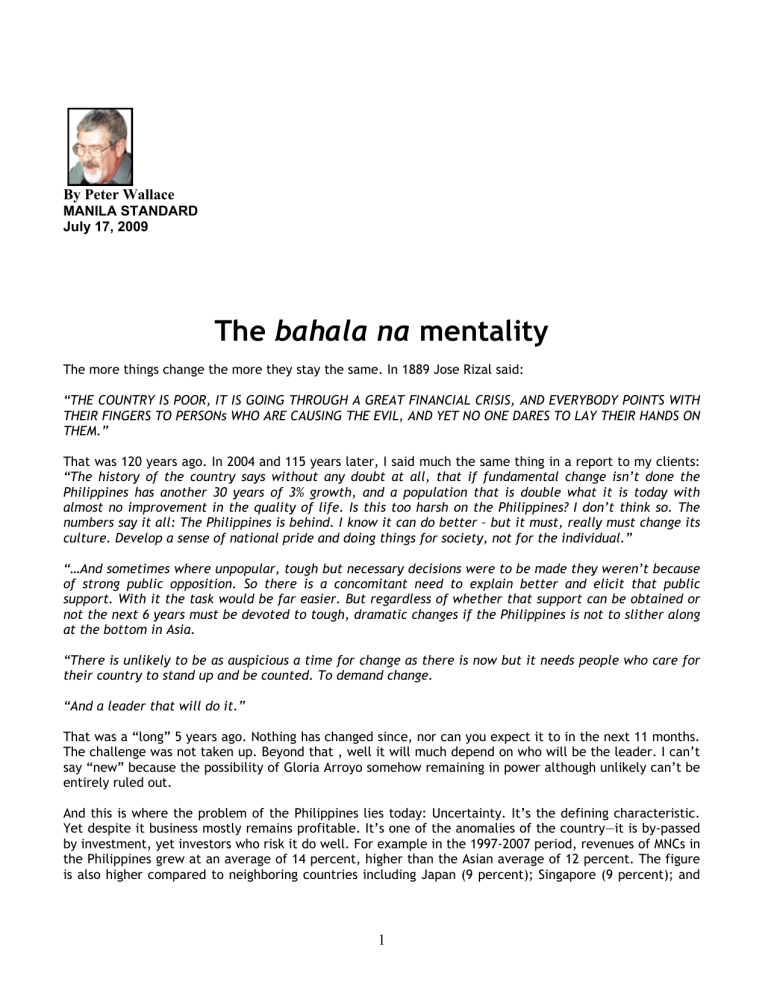
By Peter Wallace MANILA STANDARD July 17, 2009 The bahala na mentality The more things change the more they stay the same. In 1889 Jose Rizal said: “THE COUNTRY IS POOR, IT IS GOING THROUGH A GREAT FINANCIAL CRISIS, AND EVERYBODY POINTS WITH THEIR FINGERS TO PERSONs WHO ARE CAUSING THE EVIL, AND YET NO ONE DARES TO LAY THEIR HANDS ON THEM.” That was 120 years ago. In 2004 and 115 years later, I said much the same thing in a report to my clients: “The history of the country says without any doubt at all, that if fundamental change isn’t done the Philippines has another 30 years of 3% growth, and a population that is double what it is today with almost no improvement in the quality of life. Is this too harsh on the Philippines? I don’t think so. The numbers say it all: The Philippines is behind. I know it can do better – but it must, really must change its culture. Develop a sense of national pride and doing things for society, not for the individual.” “…And sometimes where unpopular, tough but necessary decisions were to be made they weren’t because of strong public opposition. So there is a concomitant need to explain better and elicit that public support. With it the task would be far easier. But regardless of whether that support can be obtained or not the next 6 years must be devoted to tough, dramatic changes if the Philippines is not to slither along at the bottom in Asia. “There is unlikely to be as auspicious a time for change as there is now but it needs people who care for their country to stand up and be counted. To demand change. “And a leader that will do it.” That was a “long” 5 years ago. Nothing has changed since, nor can you expect it to in the next 11 months. The challenge was not taken up. Beyond that , well it will much depend on who will be the leader. I can’t say “new” because the possibility of Gloria Arroyo somehow remaining in power although unlikely can’t be entirely ruled out. And this is where the problem of the Philippines lies today: Uncertainty. It’s the defining characteristic. Yet despite it business mostly remains profitable. It’s one of the anomalies of the country—it is by-passed by investment, yet investors who risk it do well. For example in the 1997-2007 period, revenues of MNCs in the Philippines grew at an average of 14 percent, higher than the Asian average of 12 percent. The figure is also higher compared to neighboring countries including Japan (9 percent); Singapore (9 percent); and 1 Hong Kong (8 percent). Only China (26 percent), India (21 percent) and Malaysia (20 percent) outperformed the Philippines. But there are a few problems that could be fixed. I’m writing this while spending a lazy morning on a beach in Cebu (an unusual thing for me to do — be lazy, not be in Cebu that I much enjoy) waiting to attend a wedding. Which makes me wonder about the wedding between the president and her people that began on July 1, 2004 after living 3 ½ years in cohabitation. And like so many relationships the initial hunger for each other, the excitement of being together has waned. And questions of fidelity have arisen. Has the president been faithful to the people, or betrayed them through a series of illicit affairs. Equally have the people offered the unquestioned support a leader might reasonably expect. It seems both have let each other down. What’s needed now is some marriage counselling to save the relationship. I’d be likely to counsel that what needs to be revived is trust, trust in each other and what each promises to do—and then does it. Trust is based on telling the truth, even when it can hurt you. Trust is based on adhering to your word even when it is disadvantageous to do so. Trust is based on keeping your promises, even if times have changed. As Bertie Lim of MBC reminded me, there are lies, damned lies and, statistics. This is an administration that seems to have combined the three into one. The President’s recent inability to tell the truth over something as simple—and as important to the nation—as her health highlights just how endemic lying has become. It’s such now that everything the administration says is treated with suspicion. You can’t govern like that, it’s a principal reason for the president’s wide unpopularity and difficulty in getting support for the things she wants to do. They have to be living by the motto: “Truth is a lie undiscovered”. The problem for them is that too often the lie has been discovered, truth is no longer in the lexicon of government. Even when the government is telling the truth now no one believes them so effective governance is slowed down, even thwarted as the necessary public support doesn’t follow. Laissez Faire is French. Bahala na is Filipino. She’ll be apples mate might well be an Aussie response. Whatever the language is the attitude is rather universal, except here it seems to be too universal. Last week we were flying from Cebu to Manila on a 6:30 PM flight. We checked in at around 5:30, no problem. Wandered into the waiting area and spent a little on Cebu delicacies. Around 6 PM they started to call flight 570, which was strange as we were on 576 and surely there couldn’t be two leaving so soon after one another. Sure enough they weren’t. Ours was delayed 2 hours. These things happen, but what shouldn’t happen is – bahala na, who cares. Why weren’t we told at check-in (they knew) so we could return to the comfort of the hotel for a couple of hours instead of stuck in a totally inadequate, dingy terminal. I even saw Bahala na at the Shangri-La Mactan Island hotel. It’s a magnificent hotel but they still twist wires together and use cheap, indoor junction boxes to terminate wires in the garden—a recipe for shortcircuits, followed by fire in the rainy weather. Bahala na. The striving for excellence is not there. It’s a story we’re all familiar with in our work. It’s an attitude easily changed through explanatory management—a reason MNC’s with their imported demand for excellence generally do better than their local counterparts, until those counterparts too realize what it is 2 that’s needed. Jollibee is the epitomy of that. There are some MNC’s that could learn from the striving for excellence of Tony Tan Caktiong. Maintenance is an English word derived from Latin manū tenēre (to hold in the hand) manus means hand + tenēre means to hold. It’s practiced in both countries. There is no Filipino word for maintenance which must explain why it isn’t done. How can you do what you can’t say. Rust breaking through the steel struts on a pavilion because they’re not regularly painted—in a hotel a scant 15 years old is just one small example. The Sydney Harbour Bridge is 77 years old and still in excellent condition because it’s repainted every year. The maintenance is continuous and thorough. Has anyone checked the air filters in the aircons in your house recently? A word that does work though is: “Tsismis”, gossip. That ubiquitous, universal, unavoidable, human activity. It dominates conversations. The fascinating thing here is that much of it turns out to be true. Exaggerated perhaps, but a sufficient core of truth to make the stories fascinating. What is strange is that anyone thinks they can keep a secret. All it needs is a maid or driver who isn’t even noticed, or a disgruntled employee and the lid is blown off. They talk and the message filters out, and up. Well back to work and the search for excellence. 3
